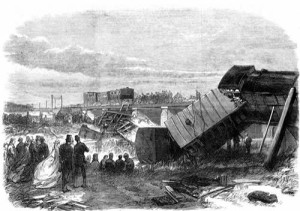 CFP: NVSA 2015
CFP: NVSA 2015
Victorian Accidents
University of Rhode Island, Providence
April 10-12, 2015
Deadline: October 15, 2014
Featuring keynote panelists
Elaine Freedgood (NYU) and Ross Hamilton (Barnard)
The Northeast Victorian Studies Association calls for papers for its annual conference; the topic this year is Victorian Accidents. The committee encourages papers on any aspect of chance, disaster, contingency, and the unexpected, as well as reflections on how Victorians imagined the category of the accidental.
How did an era consumed with the creation of totalizing systems account for chance? How could accidents seem at once spectacular and routine, tragic and entirely expected? How did accidents register on the sensorium? How did the fear and titillation they aroused shape Victorian sensibilities? What does it mean to see the random as an agent of historical (or evolutionary) change? What efforts arose to fit accidents into patterns, to transcend the merely contingent? What is the relationship between accident and crisis, between deviation from a normal course of events and predicted change over time? How are accidents productive in literary terms, whether as plot twists, ironies or creative misreadings? How did Victorians try to mitigate the problem of accidents—through such varied means as social reform, insurance plans, and the elaboration of religious or philosophical systems that could make the accidental appear irrelevant? How did the Victorians confront the unintended consequen-ces of technological change and geopolitical development?
Papers may focus on historical, literary, philosophical, financial or scientific accidents, and their impact on the construction of meaning throughout the Victorian era.
Topics for consideration may include, but are not limited to, the following:
Theorizing the accident:
- Darwin and evolutionary theory
- Accident and the secularization narrative
- Accidental versus Ideal
- Accident and scientific discovery
- Inductive reasoning
- Gothic architecture
- The Exception and the Rule (or the Sociological Exception)
Accidents of transportation and exploration:
- Staplehurst rail crash of 1865 and other train accidents; railway trauma
- Urban transport accidents (omnibus, wagon, velocipede, bicycle)
- Literary shipwrecks (Brontë, Villette; Hopkins, “The Wreck of the Deutschland”; Collins, Armandale; Robinsonades)
- The search for the Northwest Passage
- The Franklin expedition
- Lost world adventure fiction
- Rontgen and the x-ray
- Turner’s slave ship
Industrial accidents:
- Factory and mine accidents
- Visual & literary portraits of the factory cripple
- Dickens, Hard Times
- Gaskell, Mary Barton
- Engels, The Condition of the Working Class in England
Geopolitical mischances and blowback:
- The Crimean War
- The Afghanistan Wars
- The Boer Wars
- The death of General Gordon
- The Indian rebellion of 1857
- Tennyson, “The Charge of the Light Brigade”
Literary forms and the plotting of accident:
- Sensation fiction
- Melodramatic devices
- Contingency, coincidence, and irony
- Love at first sight
- “Bad timing” (characters who arrive too early/too late, misplaced objects, letters delivered to the wrong person…)
- Unwanted pregnancy
- Rhyme and other poetic devices
- Mistranslation (Dante Gabriel Rossetti, Edward FitzGerald)
- Slips of the tongue
- Printing and publication accident
Regulating chance:
- Board games
- Gambling
- Insurance
- Blue books and social investigation
Panics:
- Stock crashes
- Fear of live burials
- Cholera epidemics
- Urban fires
Preventing accidents:
- Factory Acts
- Industrial safety measures
- Employer Liability Acts
- Criminalizing certain kinds of negligence
The opposite of accident:
- Fatality and determinism
- Providence
- Galton and hereditary theory
- Free will
- Occult and supernatural explanation
- Deductive reasoning
- Plottedness: the inevitability of certain forms
- Suspense
Proposals (no more than 500 words) by Oct. 15, 2014 (email submissions only, in Word format), should be sent to: Greg Vargo, Chair, NVSA Program Committee: greg.vargo@nyu.edu
Please note: all submissions to NVSA are evaluated anonymously. Successful proposals will stay within the 500-word limit and make a compelling case for the talk and its relation to the conference topic.
Please do not send complete papers, and do not include your name on the proposal.
Please include your name, institutional and email addresses, and proposal title in a cover letter. Papers should take 15 minutes (20 minutes maximum) so as to provide ample time for discussion.
The Coral Lansbury Travel Grant ($100.00) and George Ford Travel Grant ($100.00), given in memory of key founding members of NVSA, are awarded annually to the graduate student, adjunct instructor, or independent scholar who must travel the greatest distance to give a paper at our conference. Apply by indicating in your cover letter that you wish to be considered. Please indicate from where you will be traveling, and mention if you have other sources of funding.
To join NVSA, or to renew your membership for 2014-2015, please return the form below to Prof. Joan Dagle at the address indicated.